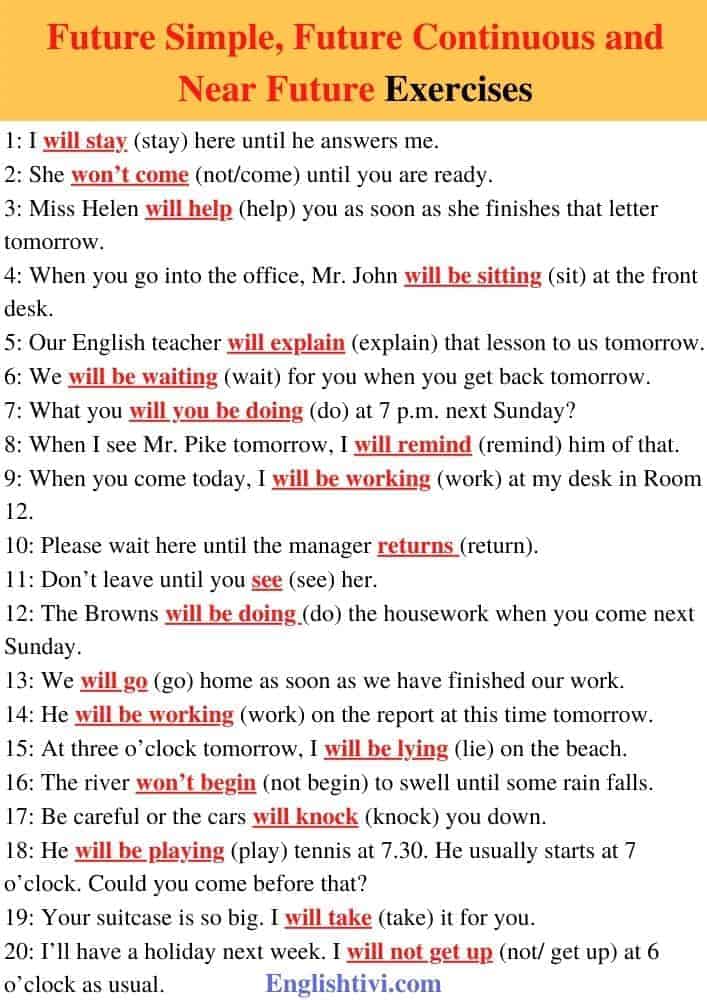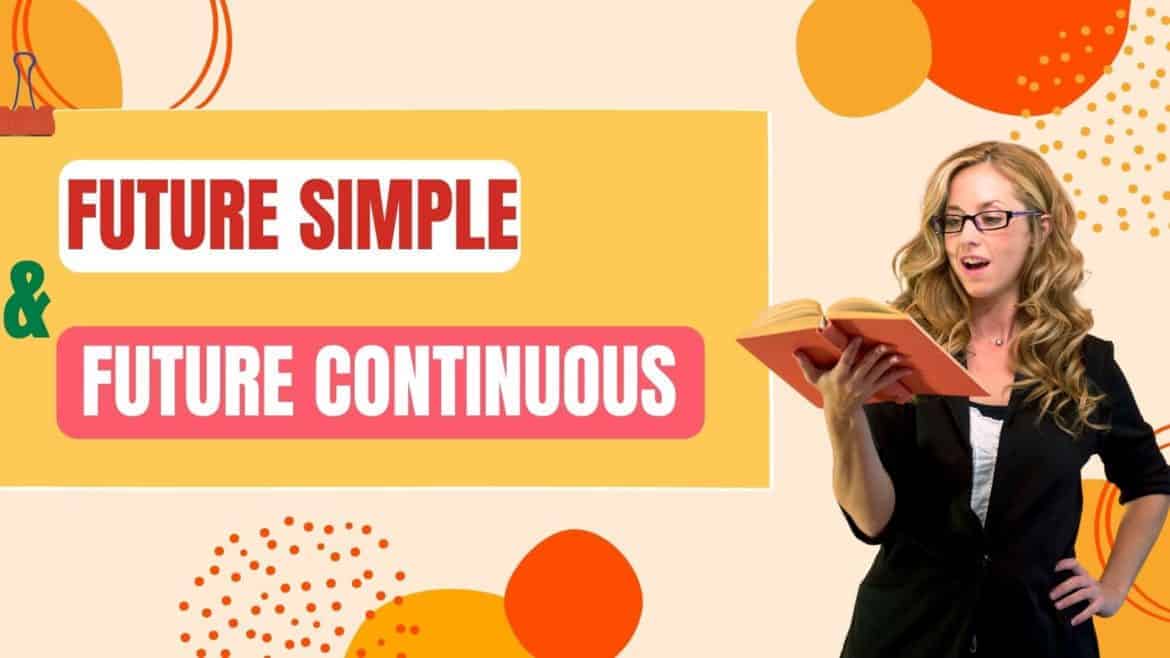The Future Simple vs the Future Continuous is also 2 tenses with very high frequency in the official test. In addition, in the future tense, there is a near-future tense that is also easy to confuse you. To better understand these tenses, you can follow the comparison table below.
⏩ Sign Up to Get Bonus
You might also like: ALL the English Grammar Basics You Need
Structure of Future Simple and Future Continuous
| Future Simple | Future Continuous | Near Future |
| (+) S + will/shall + V-inf (-) S + will/shall + not + V-inf (?) Will/Shall + S + V-inf? – Yes, S + will/shall – No, S + will/shall + not Note: • V-inf is an infinitive without “to”. • I/ We + shall • I/ We/ You/ He/ She… + will • will/shall = ‘ll • will not = won't • shall not = shan't + She will be a good mother. + We will go to England next year. | S + will + be + V-ing – Will you be waiting for her when her plane arrives tonight? – Don’t phone me between 7 and 8. We’ll be having dinner then. | 1. What do you plan to do? S + am/is/are + going to + V-inf – Where are you going to spend your holiday? 2. What are you going to do? S + am/is/are + V-ing – My father is retiring. |
How to use Future Simple, Future Continuous and Near Future
| Future Simple | Future Continuous | Near-Future |
| 1. Express a decision at the moment of speaking. – Oh, I've left the door open. I will go and shut it. 2. Expressing predictions no basis. – People won't go to Jupiter before the 22nd century. – Who do you think will get the job? 3. Used in the suggested sentence. – Will you shut the door? – Shall I open the window? – Shall we dance? 4. Promise sentence – I promise I will call you as soon as I arrive. | 1. Expressing an action in progress at a specified time in the future. – At 10 o'clock tomorrow morning, he will be working. – I will be watching TV at 9 o'clock tonight. 2. Expressing an action that is happening in the future when another action happens. – I will be studying when you return this evening. – They will be traveling in Italy by the time you arrive here. | 1. Express a plan, intention. – I have won $1,000. I am going to buy a new TV. – When are you going to go on holiday? 2. Express a prediction based on current evidence. – The sky is very black. It is going to snow. – I crashed the company car. My boss isn't going to be very happy! |
What is the Difference Between Near Future and Simple Future
| Near Future Tense | Simple Future Tense |
| We use will when we decide to do something at the time of speaking, without deciding first. Tom: My bicycle has a flat tyre. Can you repair it for me? Father: Okay, but I can’t do it right now. I will repair it tomorrow. | We use be going to when we have already decided to do something, already scheduled to do it. Mother: Can you repair Tom’s bicycle? It has a flat tyre. Father: Yes, I know. He told me. I’m going to repair it tomorrow. |
Signal words for the Future Simple, Future Continuous and Near Future
| Future Simple | Future Continuous | Near-Future |
| • tomorrow • next day/week/month… • someday • soon • as soon as • until… | • tomorrow • next day/week/m • tomorrow • next day/week/month… • someday • soon • as soon as • until… | To determine the near future tense, it is necessary to rely on the context and evidence in the present. |
See More: Distinguishing Simple Future, Near Future & Present Continuous
Future Simple, Future Continuous and Near Future Exercises
Exercises
1: I………………..(stay) here until he answers me.
2: She………………..(not/come) until you are ready.
3: Miss Helen………………..(help) you as soon as she finishes that letter tomorrow.
4: When you go into the office, Mr. John………………..(sit) at the front desk.
5: Our English teacher………………..(explain) that lesson to us tomorrow.
6: We………………..(wait) for you when you get back tomorrow.
7: What you………………..(do) at 7 p.m. next Sunday?
8: When I see Mr. Pike tomorrow, I………………..(remind) him of that.
9: When you come today, I………………..(work) at my desk in Room 12.
10: Please wait here until the manager………………..(return).
11: Don’t leave until you………………..(see) her.
12: The Browns………………..(do) the housework when you come next Sunday.
13: We………………..(go) home as soon as we have finished our work.
14: He………………..(work) on the report at this time tomorrow.
15: At three o’clock tomorrow, I………………..(lie) on the beach.
16: The river………………..(not begin) to swell until some rain falls.
17: Be careful or the cars………………..(knock) you down.
18: He………………..(play) tennis at 7.30. He usually starts at 7 o’clock. Could you come before that?
19: Your suitcase is so big. I………………..(take) it for you.
20: I’ll have a holiday next week. I………………..(not/ get up) at 6 o’clock as usual.
Answers
1: I will stay (stay) here until he answers me.
2: She won’t come (not/come) until you are ready.
3: Miss Helen will help (help) you as soon as she finishes that letter tomorrow.
4: When you go into the office, Mr. John will be sitting (sit) at the front desk.
5: Our English teacher will explain (explain) that lesson to us tomorrow.
6: We will be waiting (wait) for you when you get back tomorrow.
7: What you will you be doing (do) at 7 p.m. next Sunday?
8: When I see Mr. Pike tomorrow, I will remind (remind) him of that.
9: When you come today, I will be working (work) at my desk in Room 12.
10: Please wait here until the manager returns (return).
11: Don’t leave until you see (see) her.
12: The Browns will be doing (do) the housework when you come next Sunday.
13: We will go (go) home as soon as we have finished our work.
14: He will be working (work) on the report at this time tomorrow.
15: At three o’clock tomorrow, I will be lying (lie) on the beach.
16: The river won’t begin (not begin) to swell until some rain falls.
17: Be careful or the cars will knock (knock) you down.
18: He will be playing (play) tennis at 7.30. He usually starts at 7 o’clock. Could you come before that?
19: Your suitcase is so big. I will take (take) it for you.
20: I’ll have a holiday next week. I will not get up (not/ get up) at 6 o’clock as usual.

Future Simple vs Future Continuous Exercises PDF with Answers
Conclusion
Above is the knowledge about the future simple tense, the future continuous, and the near future tense, hopefully, the article has provided readers with the most useful information.
Besides, English tivi also synthesizes exercises and has answers for you to practice. Good luck with your studies!
Subscribe to the English TV channel on Youtube to improve your English skills!
Read more: English Grammar





